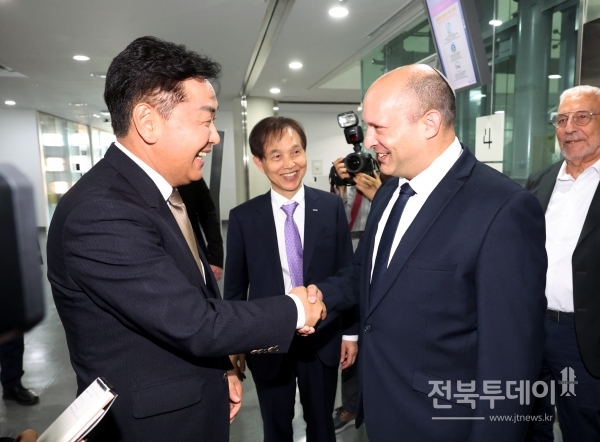On May 22, 13th Prime Minister of Israel Naftali Bennett delivered a lecture at KAIST titled “The Secret Sauce of Startup Nation”. Bennett’s visit follows the free trade agreement signed between Israel and South Korea in 2021. The agreement seeks to connect Israeli startups in the tech industry with Korean manufacturing companies. Apart from opening a seminar at KAIST with the university's leaders and entrepreneurs, Bennett held a "marathon" of economic meetings in Korea throughout May, including the first annual Korea-Israel Conference, the 2022 Asian Leadership Conference, and meetings with the chairman of LOTTE Corporation and representatives of all South Korean provinces.

Naftali Bennett was invited to speak to the KAIST community on his experience as a military officer, Minister of Economy, Minister of Education, Minister of Defense, and CEO of technology companies Cyota and Soluto. Bennett opened his lecture by highlighting the political and economic similarity between Korea and Israel. He acknowledged that “both need to rely on our brains” to compete on the global arena, being essentially landlocked by complex relationships with neighboring powers. What Bennett highlighted about Israel and its economic progress was the informal education that Israeli youth engage in from an early age, taking up responsibility and duty over peers as a way to foster leadership mentality. Along with the informal education system, he also shared that important cultural factors seem to contribute to the innovative progress of Israel. Dubbing it the "secret sauce", Bennett introduced the traditional Havruta method of pairing students to study and debate over ancient texts, which emphasizes the dynamic exchange of ideas and encourages partners to challenge and learn from each other.
Bennett also drew on his vast experiences to support his message. Bennett clearly emphasized the need to hold productive and respectful debates, to stay proactive and resilient, and to get things done no matter the obstacle. His rescue objectives in the military gave birth to creative strategies, with one resembling the "Trojan horse". He deliberately gathered a team of volunteers to recount voting ballots during his candidacy run, hired and included people with whom he fundamentally disagreed in his political team when serving as Prime Minister, and founded a company with a co-founder of a different background..
The former prime minister took many questions from the audience and from the invited KAIST founders. His answers promoted the "Women In Tech" movement, the idea of overcoming failures as a prerequisite for success, and a brighter future that can be built by the bright minds of KAISTians.

